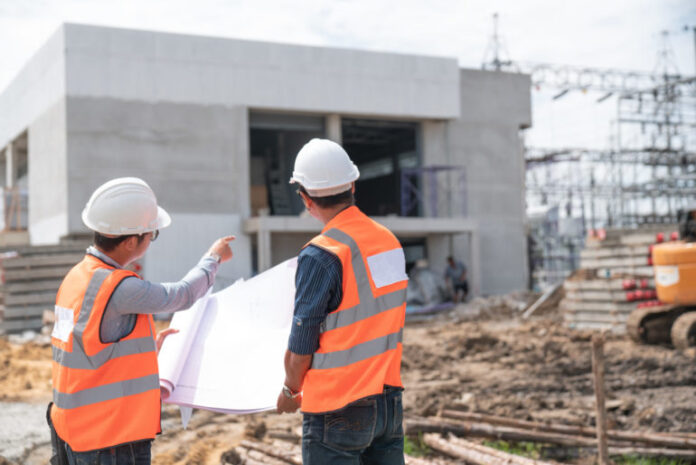Management of a construction project can be an intricate and time-consuming task.
Documenting every day is critical to any construction project’s success, both as a preventive measure against unexpected roadblocks and to serve as a historical record that will allow future mistakes to be avoided. This article details how to oversee all stages of its implementation from start to finish.
Read below for our beginner’s guide to construction project management.
1. Planning

Construction project planning requires creating an effective plan for any given construction job. A successful plan will clearly outline all of the tasks to be accomplished and their order, so team members can identify responsibilities, hold themselves accountable, and avoid redundancies from occurring.
Some construction plans focus on cost control while others emphasize schedule management. No matter which construction plan type is selected, certain mistakes must be avoided to avoid unnecessary expenses and delays.
Mistakenly failing to specify important points of contact and responsibilities is a frequent omission that can quickly create an impossible construction schedule.
2. Design
Planning is a crucial component of successful construction project management, whether you’re building a bridge or an office. A thoughtful strategy can help avoid unforeseen roadblocks and ensure you complete your project on schedule and within budget.
Construction documents like floor plans; reflected ceiling plans; elevations; sections; blueprints are covered as well. Real-time updates to software ensure you always know how your tasks are progressing whether in the office or out on site.
3. Budgeting

As much precision as possible is key when building your construction project budget. Utilizing software will allow you to monitor costs while staying within the parameters set forth by your client and their vision and expectations.
Contingency budget funds are also crucially important. For instance, if concrete prices suddenly spike and you failed to account for this in your original cost estimations, your company could wind up spending more than expected.
Tracking the progress of your construction projects to ensure they stay within their initial budgets is also of utmost importance, which is where having an outstanding accounting department can make all the difference for your company.
4. Contracts
Contracts are at the heart of every successful business venture, but their importance in construction cannot be overstated. A builder’s ability to finish on time and within budget relies on having carefully managed supplier arrangements.
Unfortunately, unexpected roadblocks often arise on construction sites that can’t be predicted in advance. Environmental issues may surface, such as excessive mud or the presence of endangered species or cultural artifacts; in such instances, project managers must develop contingency plans to respond.
5. Scheduling

Planning is the overarching process; scheduling takes this plan and breaks it down into individual tasks that must be completed. This may involve identifying which tasks depend on each other (using a WBS – work breakdown structure – is an excellent way of doing this), addressing time-related concerns, or adding in inspections required by code or local construction rules.
Consider leaving yourself some extra time for issues that arise on the job site, such as unexpected weather delays or additional work that needs to be done. A digital tool that lets you view information live is essential for this stage of construction project management.
6. Communication
Communication is key for any project, but especially on construction ones. Miscommunication can lead to delays and cost overruns; having a strong internal-committee communication system in place will help manage this issue more effectively.
As part of their work tasks, team members should discuss any expected responsibilities with one another to avoid miscommunications and ensure everyone on their team works on an equal playing field. Doing this helps avoid misunderstandings among team members while promoting greater cohesion within your group.
7. Risk Management

Risk management is an essential element of construction project management. This practice involves the identification and mitigation of any potential risk events while clarifying responsibilities between managers. A sound risk management strategy will reduce costs while guaranteeing project success.
Prioritize risks based on their impact and probability. High-impact risks should be dealt with first, such as delays or budget overruns; low-probability ones such as natural disasters should be tackled last.
Once a risk has been identified, businesses have the option of accepting, mitigating, or transferring it – such as purchasing insurance policies or outsourcing complex or sophisticated work to an experienced firm.
8. Quality Control
At the core of any successful construction project is the imperative for unwavering quality control. This essential process is the invisible scaffolding that ensures the final structure stands strong, aligning perfectly with predefined standards and specifications.
A robust quality control procedure is the touchstone of excellence, demanding routine inspections, stringent testing, and steadfast commitment to industry-leading practices. Recognizing and rectifying quality issues at the earliest stages not only helps avoid expensive rework but also effectively dodges needless delays, setting the project on the path of timely completion.
9. Procurement and Supply Chain Management

The clockwork efficiency of construction projects lies significantly in the realm of procurement and supply chain management. It is the cog in the wheel that keeps projects moving, ensuring materials and equipment are sourced with timely precision and cost-effectiveness.
The robust architecture of supply chain management guarantees that construction sites receive their needed supplies right when they need them. This orchestrated delivery helps keep downtime to a minimum while boosting productivity, laying a smooth pathway for the project to proceed on schedule and within budget.
10. Resource Allocation
Strategic resource allocation forms the heart of construction project management. It’s an intricate balancing act, weaving together the threads of labor, equipment, and materials to create a seamless tapestry of efficiency. Properly deployed, resource allocation works as a master key that unlocks optimal utilization, circumventing overallocation or shortages. This calibrated equilibrium ensures the steady rhythm of workflow, helping to stave off delays and ensure the project’s steady momentum.
11. Health and Safety Compliance

Nothing carries more weight in construction project management than the safety and health of the workers shaping the dream into reality. Adherence to stringent health and safety regulations forms the bulwark that protects every individual on the construction site. Regular safety inspections coupled with comprehensive safety training form the building blocks of a secure work environment. Implementation of rigorous safety protocols is a non-negotiable mandate, essential for preventing accidents and preserving the well-being of every member of the team.
Each of these facets are like the cardinal points of a compass, guiding construction project management toward success. When deftly managed, they create a cohesive, effective, and safe process that results in a finished product of exceptional quality.









